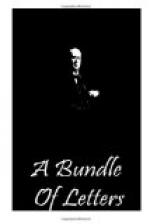However, it is the tall one, the one of the private lessons, that is the most remarkable. These private lessons, my good Prosper, are the most brilliant invention of the age, and a real stroke of genius on the part of Miss Miranda! They also take place in the petit salon, but with the doors tightly closed, and with explicit directions to every one in the house that we are not to be disturbed. And we are not, my good Prosper; we are not! Not a sound, not a shadow, interrupts our felicity. My cousine is really admirable; the shop deserves to succeed. Miss Miranda is tall and rather flat; she is too pale; she hasn’t the adorable rougeurs of the little Anglaise. But she has bright, keen, inquisitive eyes, superb teeth, a nose modelled by a sculptor, and a way of holding up her head and looking every one in the face, which is the most finished piece of impertinence I ever beheld. She is making the tour du monde entirely alone, without even a soubrette to carry the ensign, for the purpose of seeing for herself a quoi s’en tenir sur les hommes et les choses—on les hommes particularly. Dis donc, Prosper, it must be a drole de pays over there, where young persons animated by this ardent curiosity are manufactured! If we should turn the tables, some day, thou and I, and go over and see it for ourselves. It is as well that we should go and find them chez elles, as that they should come out here after us. Dis donc, mon gras Prosper . . .
CHAPTER VIII
FROM DR. RUDOLF STAUB, IN PARIS, TO DR. JULIUS HIRSCH, AT GOTTINGEN.
My dear brother in Science—I resume my hasty notes, of which I sent you the first instalment some weeks ago. I mentioned then that I intended to leave my hotel, not finding it sufficiently local and national. It was kept by a Pomeranian, and the waiters, without exception, were from the Fatherland. I fancied myself at Berlin, Unter den Linden, and I reflected that, having taken the serious step of visiting the head-quarters of the Gallic genius, I should try and project myself; as much as possible, into the circumstances which are in part the consequence and in part the cause of its irrepressible activity. It seemed to me that there could be no well-grounded knowledge without this preliminary operation of placing myself in relations, as slightly as possible modified by elements proceeding from a different combination of causes, with the spontaneous home-life of the country.




